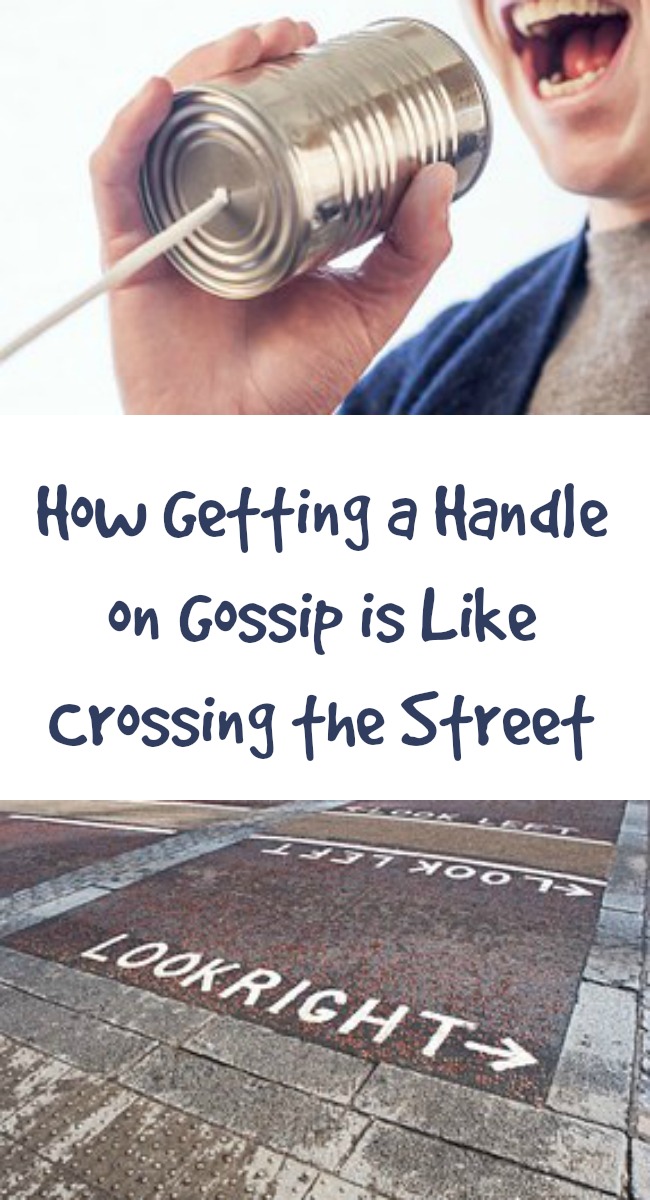How Getting a Handle on Gossip is Like Crossing The Street
 Gossip is like toothpaste.
Gossip is like toothpaste.
Gossip is like squeezed-out toothpaste. It’s easy to squeeze it out, but impossible to put it back in. Gossip is sharing private information with someone who is neither part of a problem or part of the solution. I heard that statement when I was a teenager, and have never forgotten it. Gossip is also revealing personal or sensational facts about others.
To illustrate this point in a children’s class, I borrowed a $20.00 bill from another adult (where everyone could see) and then showed the kids a brand new tube of toothpaste.
Handing a paper plate to one of the kids, I told him to squeeze all the toothpaste out of the tube that he could possibly squeeze in one fell swoop. It was a big tube, and he was a big kid. He got three-fourths of the tube onto the plate in one big glurp, and boy was he proud!
I showed him the $20 and told him the money was his once he got all the toothpaste back in the tube. His shining eyes changed to puzzlement and then became cloudy with dismay.
There was no way squeezing the toothpaste back into the tube could be accomplished, which was the point of the lesson. It was also the reason behind the clouds in his eyes.
Gossip – like words – cannot be unsaid
It reminds me of the words we say. Once they’ve been spilled, there is no putting them back. There is no erasing the damage they cause.
Does anybody want to guess how I know?!
I’ve learned a few things over the years, and I’m learning to put these steps into practice. I don’t always succeed, mind you, but I’m making progress.
It’s a good feeling to be trusted by others and to know that they feel safe in sharing their personal disappointments, failures, and losses. It’s a good feeling to become a graveyard for the pain of others and know that folks will never learn from me things that ought not to be told.
As children, we learn the rules for crossing a street safely. As adults, these are good rules to follow when we need to cross Information Street and want to do it safely without gossiping.

Avoid gossip:
stop – look – listen
Stop.
- Here in the south, we say, “Shut yo mourf!”. Don’t repeat what you hear, especially if you don’t know for certain that it’s true.
- What you want to say can always be said or repeated later.
- Remember that once it’s said, you can’t take it back.
- Ask yourself: is it really that important to share this information now or can it wait?
- Waiting will help bring clarity to a situation and help us know if this information must be shared.
- Practicing a STOP is a way to refuse to give fuel to a slow-burning fire.
My father-in-law used to say that we need to become like graveyards. We bury information brought to us and we don’t allow anyone else to dig it up. We don’t even put a grave marker on the site. That way, others won’t know we have information that could be shared.
There isn’t one of us who doesn’t want a friend like that.
The question is: are we willing to become that kind of friend?

Look.
- Look both ways. There’s danger in trying to cross the street without looking both ways.
- Look the other way and try to imagine how the person you intend to share information about would feel if they knew what you are going to tell.
- Look your own way also. Would you want someone to share this type of information about you?
That’s why we need to look both ways. We need to think about the other person and also how our perspective would change if the information were being shared about us and not the other person.
When a child stands at the edge of the road waiting to cross, it would be unsafe to step out into oncoming traffic. Not only is it unsafe to share private information with someone who is not a part of the problem or a part of the solution, it is also wrong. There’s a word for sharing that type of information. It’s Gossip. When we gossip, we are not looking both ways before we toss words out onto Information Street.
Is it gossip? Is it part of the problem? Part of the solution? If it doesn’t fit that description, then we ought to not share it because we’re really not sharing. We are gossiping.
We should ask ourselves: Is this person a part of the problem? Is he/she a part of the solution? Answering those questions will tell us whether it is right or wrong to share.
Sharing information that is not true or is painful to someone else, or that would be painful to us, is no different than stepping out in the middle of the road when there is oncoming traffic. Casualties and sometimes fatalities are certain to occur.
We all want a friend who looks out for us to make sure we don’t become a casualty.
The question is: are we willing to be that kind of friend?

Listen.
- Listen to your heart and your motive for giving out information. Is your reason for sharing to build up or to tear down?
- What is your purpose? Hurting people hurt people. It’s that simple.
- If you’re prone to want to share idle tidbits, ask yourself why it feels good to divulge that information.
- Is it because you, yourself, are hurting? Don’t allow yourself to get caught in that trap.
- If you’re hurting, recognize your own pain and then make sure Satan doesn’t get a foothold through your wounded heart.
It’s true that sometimes we feel a need to vent to someone else. I have a friend I can call and say, “Excuse me while I vent.”
This is my signal to my friend that I am just venting and I expect this to go no further. It also tells her I recognize that my emotions are out of whack and I will feel differently in a day or two.
We need friends who can steer us in the right direction. Those friends can help us not pass on gossip. We need friends who will say to us, “I’m not going any further with this and you should not, either.
All of us want to have a friend like that.
The question is: are we willing to be that kind of friend?

When we take the time to Stop, Look, and Listen, we become free of Gossip. It takes work, persistence, and effort, but it’s worth the discipline to make it safely to the other side of the street.
Gossip is a formidable foe, but we can defeat it in our lives if we consistently utilize this strategy and find a friend with whom we can safely vent in confidence.
All of us need that kind of friend.
The question is: are we willing to be that kind of friend?

This is a repost from 7 years ago.





